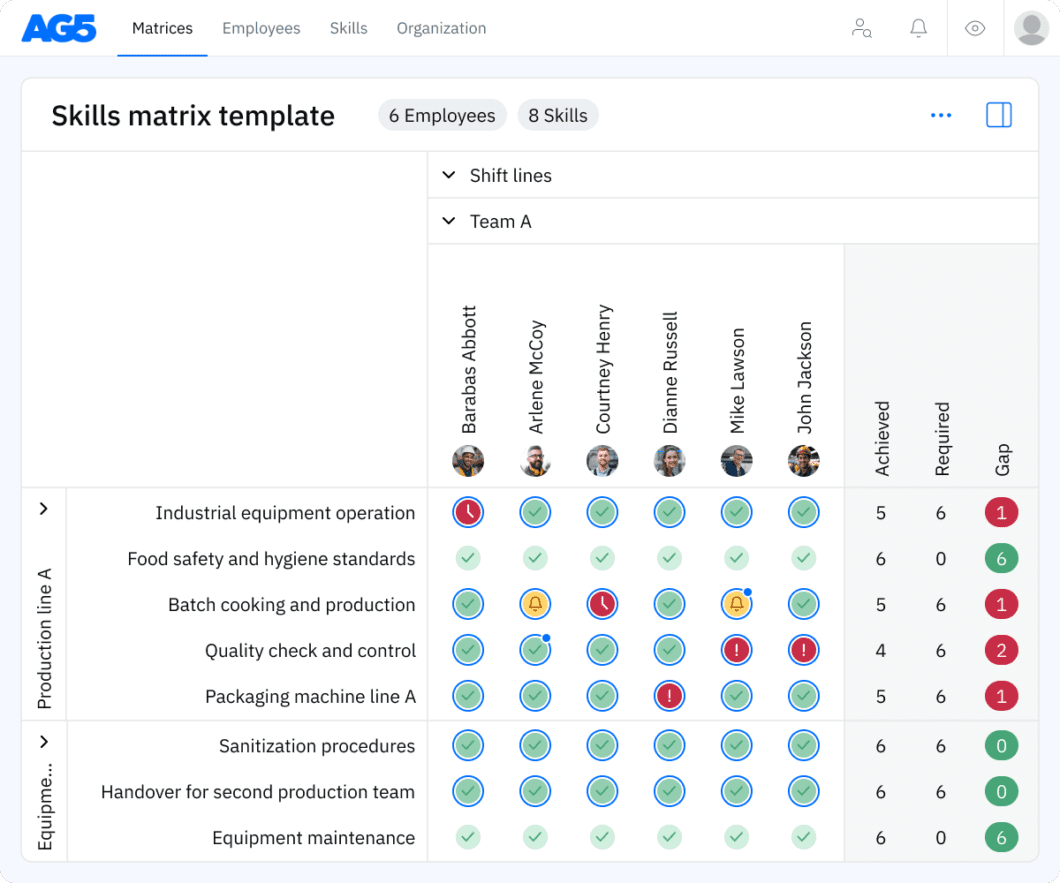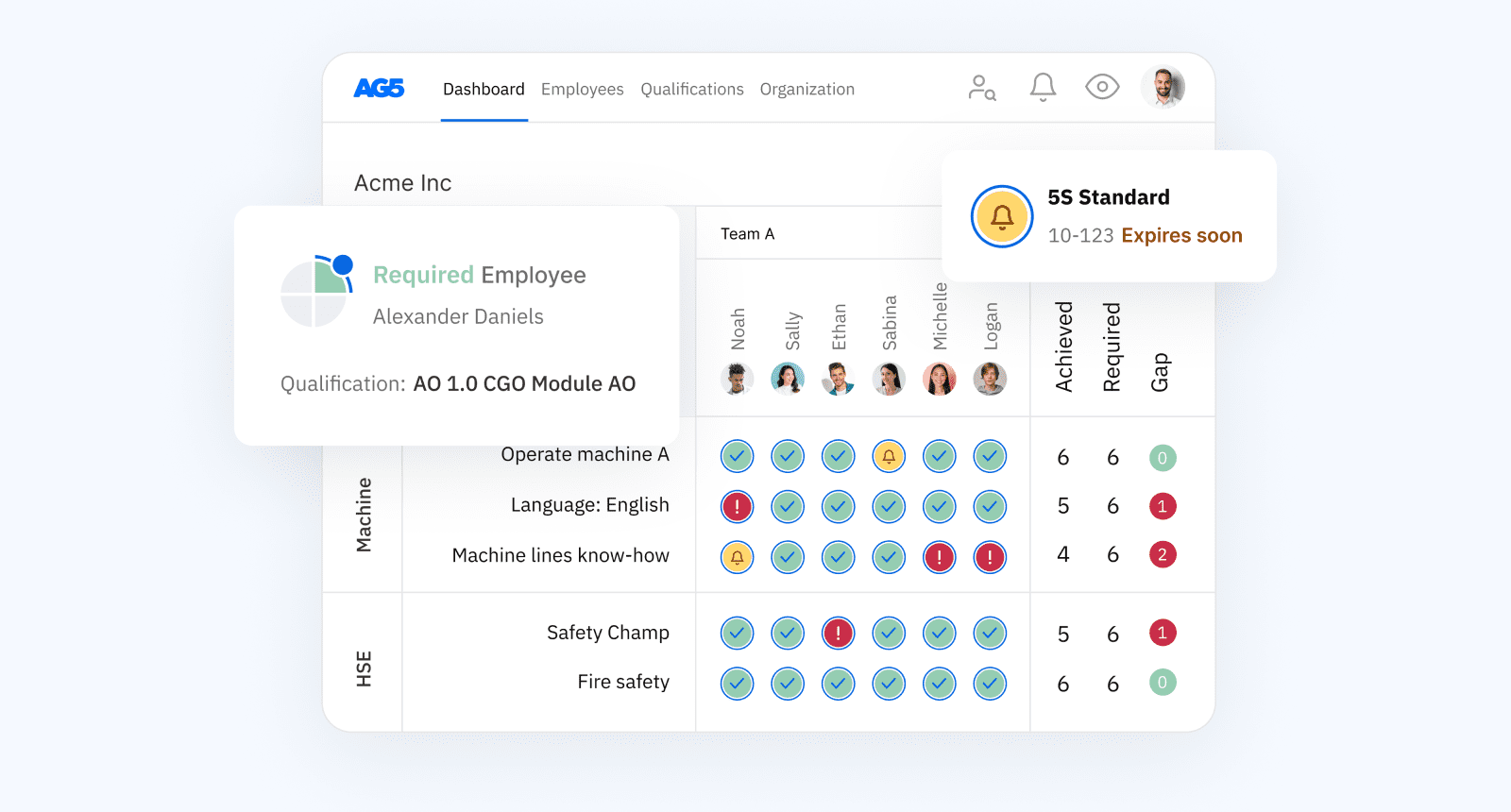Quality assurance skills matrix template
A skills matrix template is a tool that can be used in quality assurance to effectively manage and assess the skills and knowledge of individual employees or teams.
Download your free template here

Overview Copied
A skills matrix template is a tool that organizations can use to effectively manage and assess the skills and certification statuses of individual employees or teams.
For example, you can use this quality assurance skills matrix template to monitor the certification statuses of certifications such as Certified Quality Engineer (CQE) or Six Sigma, ensuring that employees possess essential skills in statistical process control, root cause analysis, and quality management, all of which are crucial for upholding and improving manufacturing standards and processes.
Quality management
- Statistical process ontrol
- Root Cause Analysis (RCA)
- Quality planning
- Process improvement
- Audit planning and execution
Lean six sigma
- Lean Six Sigma Green Belt
- Lean Six Sigma Black Belt
- Lean Six Sigma Yellow Belt
- Process mapping
- Data collection and analysis
- Kaizen events
- Value stream mapping
- Project management
ISO standards
- ISO 9001 Lead Auditor
- ISO 14001 Lead Auditor
- ISO 45001 Lead Auditor
- Quality Management System (QMS) standards
- Environmental Management System (EMS) standards
- Occupational Health and Safety (OH&S) standards
- Audit planning and execution
- Compliance assessment
Specialized quality roles
- Visual inspection
- Test planning and design
- Non-Destructive Testing (NDT)
- Validation processes
- Quality risk management
Benefits Copied
Using a quality assurance skills matrix template can benefit your teams in various ways. Among them:
- Competency alignment. Ensure that manufacturing QA teams possess key competencies like statistical process control and root cause analysis, aligning skills with industry standards to enhance the precision and effectiveness of quality control processes.
- Regulatory compliance. Facilitate adherence to stringent manufacturing regulations by tracking certifications such as ISO 9001 Lead Auditor, ensuring that QA professionals possess the knowledge and skills necessary for compliance and successful audits.
- Continuous improvement:. Promote a culture of continuous improvement by monitoring Lean Six Sigma certifications, empowering QA teams to optimize manufacturing processes, reduce defects, and enhance overall operational efficiency.
- Risk mitigation. Identify and mitigate risks associated with product quality through certifications like Certified Reliability Engineer, fostering a proactive approach to reliability and maintenance planning, minimizing the likelihood of defects and operational disruptions.
- Supplier quality assurance. Ensure excellence in the supply chain by tracking certifications such as Certified Supplier Quality Professional, guaranteeing that QA professionals possess the skills needed to assess, manage, and improve supplier quality.
Download the free Excel Quality assurance skills matrix template Copied
We also have a free Excel template available that you can download if you are not ready to get started with AG5. To download it, please complete this form here.
Customizing a skills matrix Copied
The scope of a skills matrix can be as large or small as you choose. For example, it could cover your entire quality assurance team – or only the.
To customize a skills matrix to your needs, you should:
- Define focus. Clarify if the skills matrix pertains to an entire department or specific roles within it.
- Identify key skills. List essential competencies for each role or area of operation.
- Establish proficiency levels. Define skill proficiency levels, aligning them with job requirements.
- Set evaluation criteria. Create a clear evaluation process, considering on-the-job performance and training qualifications.
- Regularly review and update. Ensure regular reviews to adapt to evolving roles, technologies, and organizational goals.
Looking for alternatives to Excel for your skills matrix templates? Copied
AG5’s skills management software enables you to visualize and close skills gaps across your organization – no need for complicated Excel spreadsheets. You’ll use intuitive skills matrices that bring together skills data and job requirements – and are always up to date.

Frequently asked question Copied
-
What are the benefits of using a quality control skills matrix?
-
Is this quality control skills matrix free to download?
-
How do I use a quality control skills matrix?
-
What if I want to take my skills management to the next level?
Author Copied
Revisions Copied
Tired of managing skills in Excel?
Say goodbye to Excel matrices. Start using AG5’s plug and play skill matrix software.
Recognized by G2 for Excellence in Skills Management

